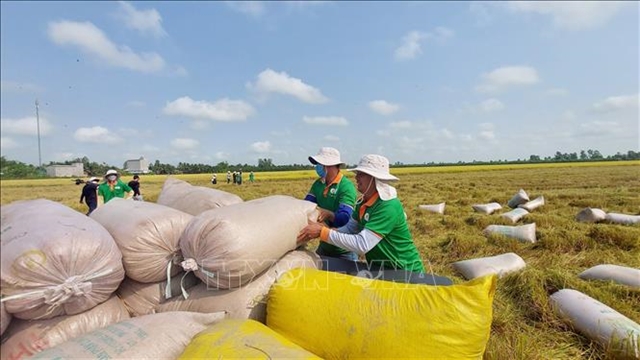 Society
Society

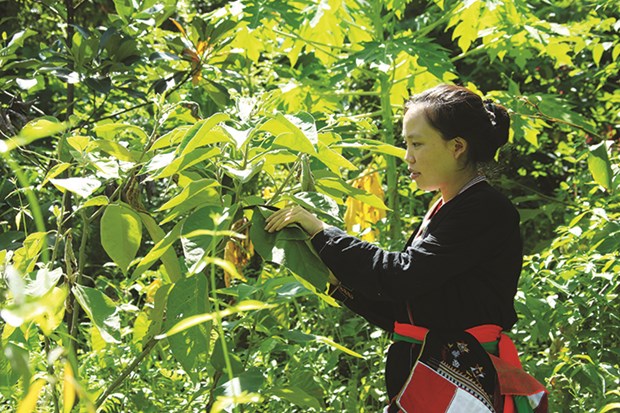 |
| Many Dao households in Ba Vì have established medicinal herb gardens. This not only preserves valuable medicinal plants but also actively contributes to the economic development of their households. — Photo courtesy of the Hà Nội Department of Agriculture and Rural Development. |
HÀ NỘI — Ba Vì is a commune located on the mountainous belt in Ba Vì District, with a 98 per cent of the population belonging to the Dao ethnicity. Implementing the Party's guidelines and the state's policies, the Dao people here have gradually abandoned their nomadic and migratory lives to stay in a fixed place and develop their economy. However, over generations, the Dao people of Ba Vì have not abandoned the traditional profession of their ancestors, which is traditional medicine.
The Dao people of Ba Vì practise traditional medicine primarily to treat their own people's illnesses. It cannot be denied that the Dao people of Ba Vì have acquired this ability through the inheritance of the traditional knowledge of the ethnic group as well as the inheritance of ancestral experience within their own lineage and families.
Lăng Văn Hà, Chairman of the People's Committee of Ba Vì Commune, stated that the Dao people in the commune have inherited their forefathers' experience in the medicine-making profession. Currently, the commune has 309 households engaged in traditional medicine, with nine traditional medicine cooperatives organised and operating in accordance with the Cooperative Law. They standardise traditional medicine recipes, produce them on modern production lines, and contribute to improving product quality while ensuring product safety. Traditional medicine is a priceless resource for protecting human health.
Preserving and developing the traditional medicine profession not only contributes to the livelihoods of the Dao people in Ba Vì but also adds to the national treasury of traditional medicines. After being harvested, medicinal materials are finely chopped into various sizes to suit their intended use. Subsequently, the medicinal materials are thoroughly washed and dried while still retaining their medicinal properties. After this process, the medicine is carefully packaged and stored.
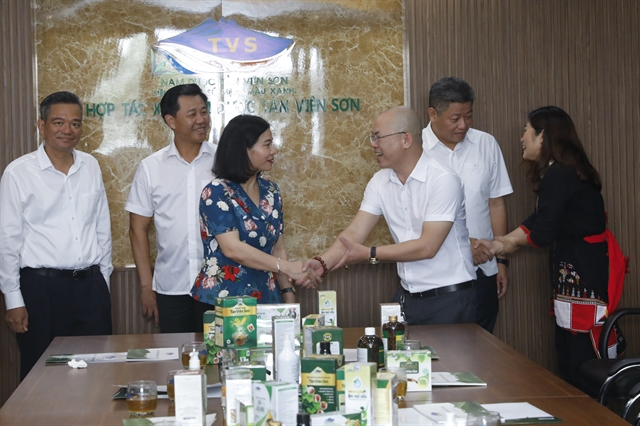 |
| Deputy Secretary of the Hà Nội Party Committee Nguyễn Thị Tuyến, along with other city officials, visited the Tản Viên Sơn Herbal Cooperative in Tản Lĩnh Commune, Ba Vì District. |
Herbalist Triệu Thị Dung in Hợp Sơn, Ba Vì, shared: "These traditional herbal recipes have been passed down from my parents. The source of medicinal materials comes from various types of plants that grow naturally in lush forests. I continue to plant and harvest them, using what's needed and naturally air-drying them without soaking or using any preservatives."
According to the accumulated experience passed down through generations of the Dao people, traditional medicine is typically prepared in the form of "medicinal decoctions" for consumption and "medicinal baths". Nowadays, with continuous learning and improvements in the traditional remedies of their ethnic group, the Dao people of Ba Vì have conducted research and combined over 100 medicinal plants to create various types of medicinal extracts that can treat a wide range of illnesses. Many effective herbal formulas have been developed for convenient use while retaining their therapeutic properties.
Recognising the value of these traditional herbal remedies, traditional medicine practitioner Lăng Thị Châm, one of the pioneers, established the Cooperative for Traditional Herbal Medicine of the Dao ethnic group in Yên Sơn, Ba Vì. Recently, the cooperative changed its name to the Traditional Medicine Cooperative of Tản Viên Mountain and invested in a modern traditional medicine production plant in Bát Đầm, Tản Lĩnh, adjacent to Yên Sơn. This facility meets Good Manufacturing Practice (GMP) standards.
Lăng Thị Châm, Chairwoman of the Tản Viên Traditional Medicine Cooperative, shared: "We moved to this new location to have a larger area and suitable conditions for building a larger-scale manufacturing plant. This will provide better conditions for producing and increasing the value of Dao ethnic traditional herbal remedies."
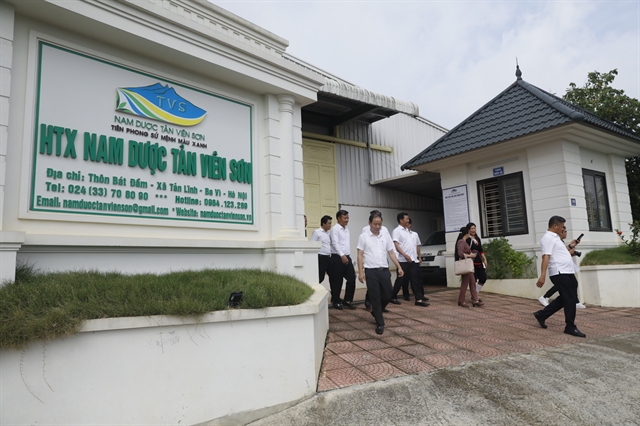 |
| The modern traditional herbal medicine factory of the Tản Viên Sơn Herbal Cooperative, located in Bát Đầm hamlet, Tản Lĩnh commune (Ba Vì district), meets the Good Manufacturing Practice (GMP) standards. |
According to Châm, the transition from traditional production methods to modern production lines is a significant step in the Dao people's herbal medicine profession. While they still use traditional medicinal materials, the production process is entirely closed-loop. Instead of boiling the medicine over a wood-burning stove, the Traditional Medicine Cooperative of Tản Viên Mountain concentrates their medicinal extracts using a vacuum cooker combined with mixing in vacuum tanks, creating safe products.
The Traditional Medicine Cooperative of Tản Viên has also established microbiological and physical-chemical research rooms and has recruited university graduates with pharmaceutical majors to ensure specialised knowledge and compliance with healthcare industry regulations.
"Currently, the Traditional Medicine Production Plant of the Traditional Medicine Cooperative of Tản Viên Mountain is producing and introducing to the market many products such as health supplements under the 'Tản Viên Sơn' brand, various herbal teas, and cosmetic products like herbal shampoo and shower gels, all of which draw their original value from the traditional herbal remedies of the Dao people in Ba Vì," said Châm.
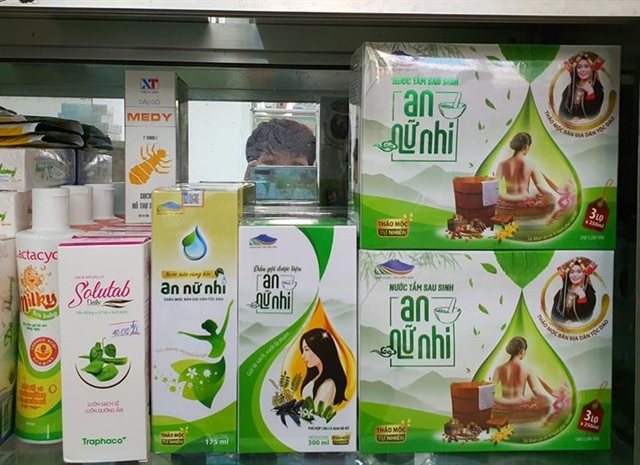 |
| Currently, the Traditional Herbal Medicine Factory of the Tản Viên Sơn Herbal Cooperative has introduced various products to the market, including health supplements, herbal teas, and cosmetics such as herbal shampoos and postpartum bathwater. These products are all derived from the original values of traditional herbal recipes of the Ethnic Dao in Ba Vì. |
Presently, the Traditional Medicine Cooperative of Tản Viên Mountain provides regular employment for 30 workers. The cooperative has also partnered with 10 families in the surrounding area of Ba Vì mountain for the supply of herbal materials. Over time, the Traditional Medicine Cooperative of Tản Viên Mountain has participated in Hanoi's "One Commune, One Product" (OCOP) programme and has developed five OCOP four-star products, including kidney-enhancing tea, joint-nourishing extract, lung-reinforcing extract, herbal shampoo for women, and female genital solution.
The standardisation of traditional herbal remedies and the closed-loop production on modern production lines have contributed to enhancing product quality and ensuring product safety. Furthermore, the investment in applying modern technology to herbal medicine production according to the GMP standard by the Traditional Medicine Cooperative of Tản Viên Mountain is an effective way for other herbal medicine cooperatives in Ba Vì commune to improve their production processes and create a brand for the Dao people's herbal remedies.
The article is published with coordination of Hà Nội's Division of Rural Development. — VNS




